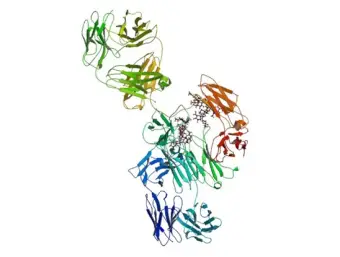Vedolizumab API Manufacturers & Suppliers
Find, compare & contact
Filters
Custom request?
Type
Production region
Qualifications
Country of origin
Producer
Produced in:
Established in: 2019
MOQ: 1 g
Employees: 10+

Focused on pharmaceutical industry

Reasonable price for the customers

Full service from R&D stage to commercial stage
+ 0
All certificates
How does it work?
You can register for free as long as you are registering on behalf of a legal company related to the pharmaceutical industry
Search in the search bar the product that you’re looking for. We’ll show you an overview of all available suppliers. Use the filters to select the relevant suppliers only
Have you found interesting suppliers? Then it’s time to contact them. Use the send inquiry button and send them a message. You can send for each product, 3 inquiries per week
Suppliers get notified by Pharmaoffer that they’ve received a new inquiry. They will come back to you with their questions, certificates, and offer in the chat on Pharmaoffer. We will send you an email in case of any news
Does the supplier meet your quality and commercial requirements? Then you can place the order. Just follow the steps of our order module
Looking for Vedolizumab API 943609-66-3?
- Description:
- Here you will find a list of producers, manufacturers and distributors of Vedolizumab. You can filter on certificates such as GMP, FDA, CEP, Written Confirmation and more. Send inquiries for free and get in direct contact with the supplier of your choice.
- API | Excipient name:
- Vedolizumab
- Synonyms:
- Entyvio
- Cas Number:
- 943609-66-3
- DrugBank number:
- DB09033
- Unique Ingredient Identifier:
- 9RV78Q2002
About Vedolizumab
You can find a short description about Vedolizumab here. Vedolizumab is a recombinant humanized IgG1 monoclonal antibody directed against the human lymphocyte α4β7 integrin, a key mediator of gastrointestinal inflammation. It is used in the treatment of moderate to severe active ulcerative colitis and Crohn's disease for patients who have had an inadequate response with, lost response to, or were intolerant to inhibitors of tumor necrosis factor-alpha (TNF-alpha) or other conventional therapies. By blocking its primary target, α4β7 integrin, vedolizumab reduces inflammation in the gut.
Vedolizumab is administered by IV infusion over a period of 30 minutes;after the first dose, it is given again at two and six weeks and then every 8 weeks thereafter.
You can find more info about this product by clicking on the DB ID above.
Vedolizumab is a type of Immunostimulants
Immunostimulants are a vital subcategory of pharmaceutical active pharmaceutical ingredients (APIs) that play a crucial role in bolstering the immune system. These substances, also referred to as immunomodulators, are designed to enhance the body's natural defense mechanisms and promote a more robust immune response. Immunostimulants are widely used in the development of drugs and vaccines, particularly for the treatment and prevention of infectious diseases.
These pharmaceutical compounds work by activating various components of the immune system, such as macrophages, natural killer cells, and T-cells. By stimulating these immune cells, immunostimulants help in improving the body's ability to recognize and eliminate pathogens, thereby reducing the risk of infection and enhancing overall health.
Immunostimulants can be derived from various sources, including synthetic chemicals, plant extracts, and biological agents. Examples of commonly used immunostimulants include interferons, interleukins, and Toll-like receptor (TLR) agonists. These substances can be administered through different routes, such as oral ingestion, injection, or topical application, depending on the desired therapeutic effect.
Pharmaceutical companies invest significant resources in the research and development of immunostimulant APIs due to their potential to revolutionize disease management. By harnessing the power of the immune system, these APIs offer promising solutions for various medical conditions, including viral infections, cancer, and autoimmune disorders.
In conclusion, immunostimulants are a critical subcategory of pharmaceutical APIs that stimulate the immune system to enhance its defense mechanisms. Their use holds great potential in the prevention and treatment of various diseases, making them an essential focus for pharmaceutical research and development.
Vedolizumab (Immunostimulants), classified under Immunomodulators
Immunomodulators, a category of pharmaceutical active pharmaceutical ingredients (APIs), are substances that help regulate and modify the immune response of an individual. These compounds play a crucial role in treating various immune-related disorders and diseases. Immunomodulators work by either enhancing or suppressing the immune system, depending on the specific condition being treated.
Immunomodulators are used in the treatment of autoimmune disorders, such as rheumatoid arthritis, multiple sclerosis, and psoriasis. By suppressing the immune system, these APIs help reduce the overactive immune response associated with these conditions, thereby alleviating symptoms and preventing further damage to the body's tissues.
On the other hand, immunomodulators are also employed to boost the immune system in cases of immunodeficiency disorders. These APIs stimulate the immune response, enabling the body to better fight off infections and diseases. Additionally, immunomodulators are utilized in the prevention and treatment of organ transplant rejection, where they help modulate the immune system to accept the transplanted organ.
The development and production of immunomodulators require rigorous testing and quality control to ensure their safety and efficacy. Pharmaceutical companies carefully formulate these APIs into various dosage forms, including tablets, capsules, injections, and topical preparations, to cater to different patient needs.
In summary, immunomodulators form a vital category of pharmaceutical APIs that regulate and modify the immune system. With their ability to modulate immune responses, these compounds contribute significantly to the management and treatment of various immune-related disorders and diseases, improving the quality of life for many patients.
Vedolizumab manufacturers | traders | suppliers
We have 1 companies offering Vedolizumab produced in 0 different countries.
Get in contact with the supplier of your choice:
- Apino Pharma Co., Ltd. from China, product country of origin China
Let the supplier know whether you are looking for a product with a specific monograph such as EP (Ph. Eur.), USP, JP, BP or another quality. Or, whether you are looking for hydrochloride (HCl), anhydricum, base, micronisatum or a specific purity.
You can use the filters to find high-quality suppliers. For example, you can select GMP, FDA or ISO certified suppliers. Visit our FAQ page or use the chat box in the corner to get more information about Pharmaoffer.








